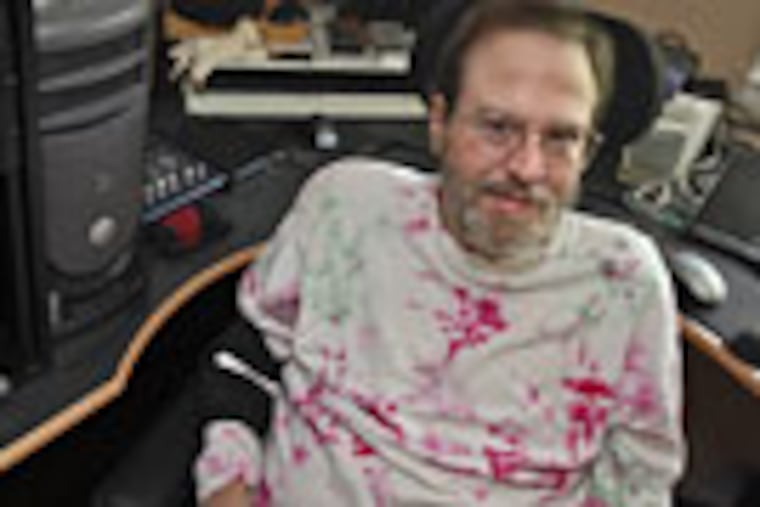
WHEN HIS disease took away his ability to play and compose music, Stephen Senderoff entered what he calls the darkest time in his life.
He had accepted his diagnosis of amyotrophic lateral sclerosis, better known as ALS or Lou Gehrig's disease. He realized that his life was going to be unfairly cut short.
But taking away his music? It was too much.
"I thought my life was over," said Senderoff, 56, of Wilmington. "
He soon realized how much more he had to live for with the support of the folks at Drexel University College of Medicine's MDA/ALS Center of Hope.
The dedicated staff at the multidisciplinary clinic introduced Senderoff, now 56, to computer music-composition software that he can control by merely clicking a mouse. Soon he was composing again, writing original pieces and working on new arrangements of classical ones.
"This has allowed me to go back to the music I need and love," Senderoff said. "I'm doing more music now than when I was fully able."
Having ALS, the Wilmington man said, "is like being in a long corridor with doors on either side. Some of them are locked, but many of them can be opened and they'll lead to new places.
"The time we have is not time waiting to die," he said. "You can live with the disease. I find the doors I can open."
Senderoff's original arrangements will be presented Saturday during "A Concert of Hope," a benefit for the nonprofit ALS Hope Foundation, at the Kimmel Center. The show will feature The Accordion Pops Orchestra and various instrumental and voice solo performances.
"Stephen is an inspiration," said Center of Hope director Terry Heiman-Patterson. "He pushes himself endlessly to do this."
ALS is a progressive degenerative disease that affects four people out of every 100,000. Although that makes the disease as prevalent as Multiple Sclerosis, it has a much lower profile, as ALS sufferers live an average of only 36 months after diagnosis.
Senderoff is an oddity: He was diagnosed in 1998. He was fairly ambulatory until recently. Now he relies on a wheelchair, and his arms sit limply on the arm rests unless someone else moves them for him.
"I have been given the gift of time, a very rare and very precious gift, and I've decided to use that time to act as an advocate," he said.
The disease needs more advocates, Heiman-Patterson said. Often, its sufferers are too ill to do the work themselves. Many people who have lost loved ones to ALS "never want to hear that word again," she said. "It's a curse word."
She recalled one fundraiser when a stranger said to her, "Why should we give money for that disease? All those people die anyway."
It strengthened her resolve to fight for her patients.
"This is not a good diagnosis, but our attitude is, you can die now or you can die later and we have to make the most of whatever time we have left," she said.
Senderoff has a Ph.D. in chemistry and worked for a local pharmaceutical company when he was first diagnosed. He stayed in the lab until he began dropping test tubes.
Before his disease, Senderoff was a well-known local musician, enjoying blues and folk songs. As the ALS progressed, he found himself unable to hold the guitar he loved so much. He switched to increasingly smaller and lighter instruments - fiddle, a banjo, a mandolin, a concertina - until he lost most of the dexterity in his fingers.
He played harmonica for a while, but it soon became impossible to lift his arms.
Now his only musical outlet is his computer composing. In his home studio, Senderoff negotiated his wheelchair so it was in front of two computer screens.
Then he hesitated.
"Trish, I need my hand," he said, prompting his wife to come over and lift his arm from his wheelchair armrest and onto the desk, his fingers within reach of the mouse.
He's eager to share his work. Among his original compositions is "Doors and Windows," written for piano and accordion, which describes the inner world of an ALS patient. In one segment, the patient flatlines and it's clear to the listener that something has gone wrong.
He played a soundscape that explores the concept of hope. It includes excerpts from speeches by Lou Gehrig and Stephen Hawking and recordings of his five grandchildren reading from Emily Dickinson's "Hope is the thing with feathers."
Hope, Senderoff said, is something he has a lot of.
"The ability to read and write music," he said, "saved my life."
A Concert of Hope Accordion Pops Concert, 7:30 p.m. Saturday, Perelman Theater, Kimmel Center, 260 S. Broad St., $40-$49, wwww.kimmelcenter.org. Info: 215-893-1999, www.ALSHopeFoundation.org.